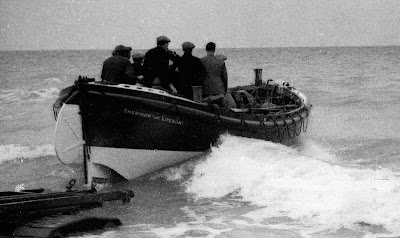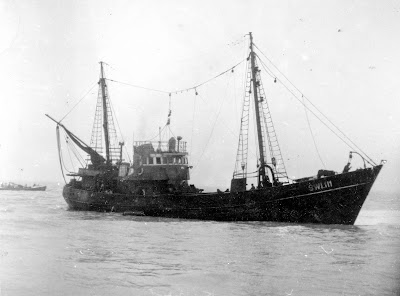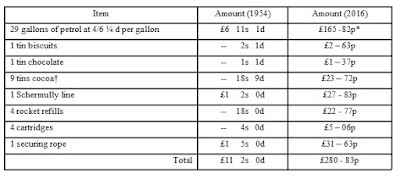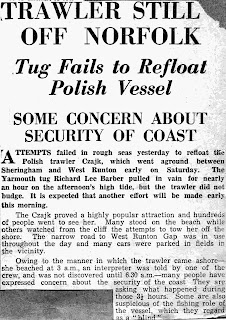One of the duties Henry had to perform as second coxswain of the Sheringham Lifeboat was to transfer to vessels in difficulties, either to liaise with the skipper or to take command of the vessel. Both types of duty were required of Henry in 1954 when there were two unusual calls at the end of the year.
The first of these service calls was to a Polish trawler ‘Czajka’ of Gdynia which had come ashore a mile east of Sheringham.
After World War II, drifters and trawlers from the Polish ports of Gdynia, Swinoujscie and Szczecin fished both the Baltic (65000 tonnes in 1955) and North Sea (45000 tonnes in 1955). The Polish fishing fleets operated as teams with motherships, larger factory trawlers and smaller fishing vessels. The ‘Czajka’ (tr. Lapwing) was one of these smaller trawlers. She was registered in Swinoujscie (number SWI.111) but her home port was Gdynia and she had a crew of 17.
This is Henry’s account of the service of the Sheringham Lifeboat to the ‘Czajka’.
Polish Trawler 'Czajka', 6th and 7th November 1954
Teddy ‘Lux’ Craske (lifeboat motor mechanic) had just gone off in his hoveller from the west beach on Saturday 6th when he spotted a vessel aground opposite Beeston Church. He immediately returned to shore and phoned Mr. Johnson, the lifeboat Hon. Sec., who ordered Teddy to fire the maroons immediately.
7.15am : Lifeboat launched with tide at half ebb and the sea calm. Tractor u/s.
 |
| ‘Foresters Centenary’ Launching in the Early 1950’s |
7.30am : Came alongside the ‘Czajka’ and I went aboard to liaise with skipper. He indicated by signs that they ran aground at 3am. I indicated that the lifeboat could try and tow the ‘Czajka’ off.
 |
| ‘Czajka’ with ‘Forester Centenary’ in Background 6th Nov. 1954 |
The skipper refused any help and so I returned to the lifeboat and we came ashore at about 9 am.
9.30am : The lifeboat was launched again and I went aboard the ‘Czajka’ to tell the skipper that the weather forecast was bad. Also, to advise them that we could put out two anchors for them and transfer a tow line to a second Polish trawler which had just arrived in the area. Again, the offers were refused so I returned to the lifeboat and we waited to see if we could help before the bad weather arrived.
 |
| ‘Czajka’ Lowering her Boat with ‘Foresters Centenary’ in Background |
2.25pm : ‘Czajka’ launched her own boat and passed a cable to the second trawler, also putting down one anchor. At high water, mid afternoon, the second trawler attempted to pull the ‘Czajka’ but the cable parted. The anchor was also recovered.
4.00pm : A third, larger, Polish trawler, the ‘Pelican’, arrived and the second trawler left, taking the ‘Czajka’’s boat with her. The ‘Pelican’ fired a line over the ‘Czajka’ and attached another towing cable, but this also parted. At this stage the ‘Pelican’ called us and we took another cable from her ¾ mile towards the shore but it was not long enough to reach the ‘Czajka’. At this stage a heavy swell was coming in, as forecast.
5.00pm : With the tide falling, it was noticed that the Czajka had knocked further up the beach during the afternoon. So we returned to shore.
 |
| People Walking Around ‘Czajka’ at Low Tide on 6th Nov. |
The Honorary Secretary had made contact with the trawler's agents at the Polish embassy in London, who were optimistic that the ‘Czajka’ would refloat on the next tide.
6.00pm : Suddenly the ‘Pelican’ fired two red rockets – the international distress signal, so we launched again without hesitation. By now the sea was rough and there was a strong NE breeze. We went to the ‘Pelican’ but could not make contact with anyone on board, so after 20 minutes were returned to station. (11 hours out).
While we were at sea, the Hon. Sec. contacted the Polish agents in London and advised them that the only way to refloat ‘Czajka’ was with a tug from Great Yarmouth. Sometime later the tug owner phoned the Hon. Sec. to say they had been approached by the trawler’s agents and wanted to find out the situation before sending a tug. They knew that sea conditions off Sheringham can be very different to those off Great Yarmouth.
10.00pm. The weather worsened and so Coxswain Henry ‘Downtide’ West phoned the tug owner to recommend postponing the towing operation.
Sunday 7th November
3.00 am : Tug ‘Richard Lee Barber’ arrived off Beeston and decided to make an attempt on the afternoon high tide.
12.00 pm : We launched into very heavy seas and collected a cable from the tug. It was too rough to go alongside ‘Czajka’, so we attempted to fire a line, but there was a fault with the Schermuly line throwing gun.
 |
| Henry Holding Cord from Line Throwing Gun Fired by Teddy ‘Lux’ Craske |
So we had no alternative but to drop down to the trawler on our own anchor, in order to pass the tug’s towing cable to them. We had a difficult time to get the tow line onto the trawler from the tug after three or four attempts. The trawler crew asked us to bring some bread and newspapers in the morning.
 |
| ‘Foresters Centenary’ Veering down on ‘Czajka’ with Tow Line from Tug |
'Richard Lee Barber’ pulled for nearly an hour without success but at least the cable did not part. The main problem was that the heavy seas kept the trawler firmly on the beach. The tug decided to wait until the next high tide.
 |
| ‘Czajka’ with ‘Richard Lee Barber’and ‘Foresters Centenary’ in Background |
The seas calmed overnight and at the next high tide on the morning of the 8th the tug pulled the ‘Czajka’ off the beach. By day-break both tug and trawler had gone.
The final part of Henry’s papers is a list of expenses associated with the property salvage case against the trawler. Prices are compared with equivalents for 2016.
* Petrol price equivalent (2016) is £1-26p per litre.
† Self-heating tins of drinking cocoa.
Henry did not comment or speculate on this grounding of a Polish trawler. However he did keep newspaper cuttings in which concerns were raised about national security at this time of rising tensions between the Eastern Bloc and the West. Here are some examples:




